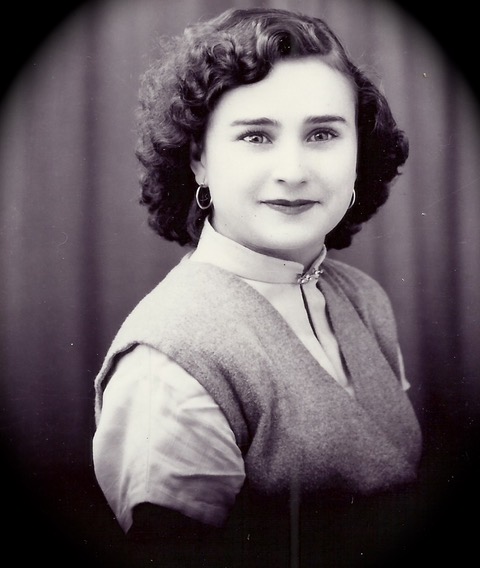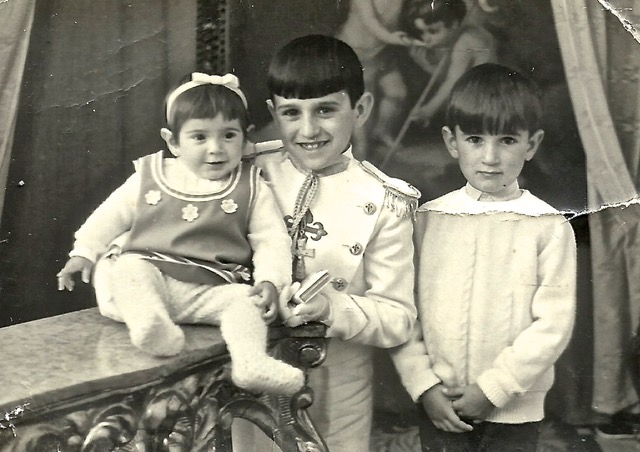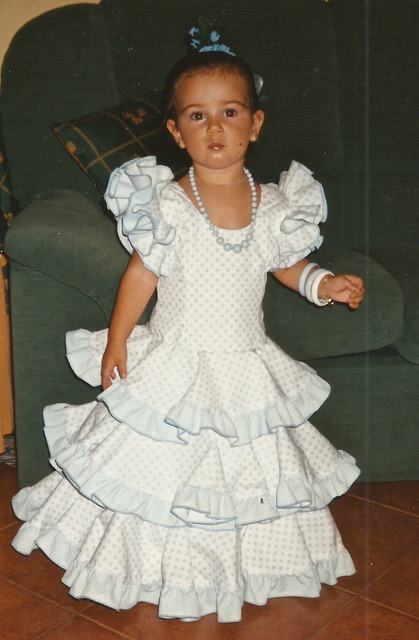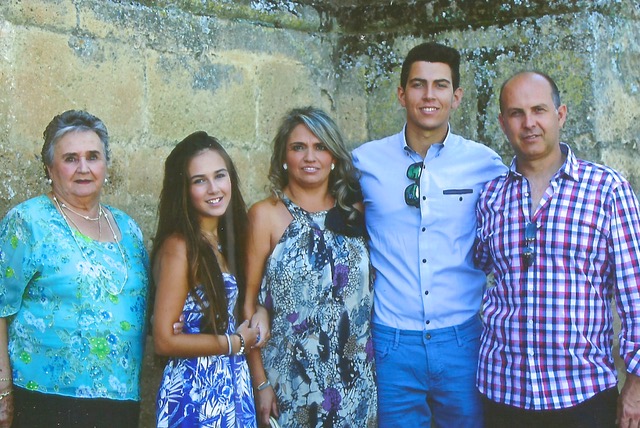
When we bought the ruin that eventually became our Spanish home, the former owner did not know how to write her name on the sales contract. Granted she was over 90, but I had not expected to find illiteracy amongst the older populations in southern Europe. Was this still a common phenomenon in these parts, I wondered?

We live in Ronda, a small town in rural Andalucía. The local community was primarily agrarian just a couple of generations back, but after the building boom of the late 20th Century most rondeños today work in the service industry.


Our part of town, the Barrio San Francisco is a typical multi-generational neighbourhood with nearly as many nonagenarians as new-borns. While 99% of the children growing up here today start school at 3 years old, some of the older generation, particularly the women, were never taught how to read or write.

Wanting to know more about the history of rural education and the changing role of Andalusian women over the past decades, I decided to have a chat with a family on our street where three generations live under the same roof.
My interviewees were the 83 year-old grandmother, her 50 year-old daughter and her almost 18 year-old granddaughter.

The Grandmother
Name: Antonia
Age: 83
Occupation: Dressmaker
Level of education: Illiterate

Antonia was born in Alpandeire (current population 252) in 1936 at the beginning of the Spanish Civil War.
“My father died when I was three months old, leaving my mother alone with my brother and myself”, she tells me. Her mother gave birth to five children, though the first three didn’t survive. As a widow with two youngsters, she had to do whatever she could to make ends meet. She would walk nearly 19 km to Ronda to be a farm labourer for a few days, after which she would walk back again in her Alpargatas, the typical Spanish rope and cloth sandals. “We walked everywhere, says Antonia. There was no other way.”

Though there were schools in most villages and travelling teachers visiting larger rural farms, her mother had to move around so much that the children never attended school. When Antonia was four years old, they moved into a cave called la Cueva del Albanico located on the trail from Alpandeire to Ronda. Her mother had by this point met a widower, whom she later married. Antonia remember her stepfather as un buen hombre (a good man), even building a bread oven for their cave house. He worked for a landowner, receiving part of the crop as his only renumeration. Life was not easy by our standards, but at least they had food. “The four of us would walk to the farm where we would work all day. There were no machines, so everything had to be done by hand.”
Some years later the family moved to Ronda where Antonia became apprenticed to a dressmaker. From the age of 12 until she became widowed at 62, Antonia sewed clothes for the families in our neighbourhood, most of whom paid her only when the completed outfits were delivered. Some didn’t pay at all. Although she was illiterate, Antonia learned how to write basic numbers and letters and developed her own code to jot down her client’s measurements. She would bring her old sewing machine under her arm if the clients couldn’t lend her theirs. Antonia clearly remembers the day when she finally had money to buy a sewing machine with a manual foot pedal – a great improvement. Only decades later would her daughter buy her an electric sewing machine.

Antonia married a football player and carpenter in 1961 and they had three children. “I would have liked to have more, but there was no space”, she says. The whole family, 12 people - her mother (again widowed), her brother with his wife and four children, as well as herself with her husband and their children lived in a small two-story home. Her brother’s family had the only bathroom, so her lot had to make do with a honey-house in the courtyard, with a curtain serving as door.

Since her husband’s income mostly disappeared in cigarettes and alcohol, Antonia was the main breadwinner. Like her mother before her, she was tough as nails. She fed her family and bought a house through her own labour. When she became a widow in 1996, Antonia finally stopped sewing and moved in with her daughter and her family. I ask her what she likes to do now. “Nothing. Watch TV… I sewed a lot, and I am tired”, says Antonia. At 83 she can finally allow herself to rest a bit.
Talking of resting, Antonia’s mother died at 93, never having had any serious illnesses in her long and hard life.
The Mother
Name: María del Mar
Age: 50
Occupation: Self employed jeweller
Level of education: Primary

Like mother like daughter they say, and this is certainly the case when it comes to Antonia and her daughter.
María del Mar was born in 1969, when Spain was still under Franco’s autocratic rule. Though tourism had started on the coast, life in rural inland Andalucía was still quite harsh. “There was no social security then,” she tells me. “We had no money to pay for doctors and medicine, so we simply couldn’t get sick.” María del Mar had to leave school after her primary education and start work to help support the family, while her brothers helped their father in his carpentry business. “I would have liked to study and become a secretary, but it wasn’t possible,” she says.

At 13, she got a job in a shop in our neighbourhood - one of those tiny corner stores that had everything from fresh food to house paint. She worked from 9 in the morning until 11 at night tending the shop, with only a short lunch break in the afternoon. Although they were long days, she loved dealing with the public. Luckily, her boss was a fair man, even paying for half her wedding dress when she got married. In the morning before work, María del Mar had to pick up a pail of milk for the family, and to get a few extra pesetas she also prepared a doctor’s young son for school. Every cent she earned went to her family. “We bought only what we needed for each day, if there was money. We ate what we had and NOTHING was ever thrown out.”

Life was very different in Andalucía then.
“I picked up the milk every morning until I was 21, and even then it came straight from the cow.”
” What”, I ask?
“I mean that the man milked the cow into a bucket straight in front of my eyes”, she explains.
Different indeed. This was just back in the 1980s, when we, the kids up in Scandinavia, were worried about learning the latest Disco moves…
María del Mar married in 1992 and had two children, but she never stopped working. She would take any job she could find, sewing toys by the unit after work at night and going to nearby villages to sell jewellery. Through her and her husband’s thriftiness, they managed to save up enough to buy a home and a property in the country. “People do not buy as much jewellery as in the past”, she tells me, but she still makes, repairs and sells jewellery 23 years later. As her husband José lost his job recently and needs to retrain for a new profession, at 50, María del Mar is back being the main breadwinner. Nothing seems to stop the women of this family!
The Daughter
Name: María del Mar
Age: Soon 18
Occupation: Student
Level of education: Completed Sr. High school. Entering University

María del Mar Jr. was born in 2001, a whole new era in rural Andalucía. Primary and lower secondary school has become compulsory in Spain. Boys and girls receive the same education and have equal chances at attending university.

Like her fellow classmates, she began school when she was 3 and has never had to help support her family. With only one parent working now, she must look to scholarships to pay for her university degree. “I would like to find a job besides university,” she says, “but it depends on the obligations of my degree.”

I do not worry about our young neighbour. She is as hardworking as her mother and grandmother, the only difference being that she is dedicating her time to her studies. She completed her Bachillerato with top marks. At soon 18, she speaks English and French, in addition to having learned ancient Greek and Latin. “I have offered to teach my grandma how to read and write, but she says it is too late. More than anything I believe she enjoys eating, because she experienced so much hardship in her childhood.“
With an illiterate (but very capable) grandmother, and an equally well-versed mother with only basic primary education, María del Mar Jr. will be the first person in her immediate family to get a university degree.

She is not alone: 45% of young Spaniards today have attained a higher educational level than their parents. Spain is today amongst those countries with the highest levels of upward intergenerational mobility in education, particularly for young women. María del Mar tells me that about 2/3 of her classmates plan to attend university, of which most are female. According to her, it is rare to have stay-at-home mothers nowadays in Ronda. Most of her friends’ mothers work outside the home, but the gender roles are still quite traditional. Whereas the fathers tend to be employed in retail, auto industries or restaurants, the mothers work in health services, house cleaning, secretarial jobs or education.

María del Mar wants to be a teacher. I ask her whether the fact that she grew up with a grandparent who could not read or write affected her career choice.
“Maybe…” she smiles shyly. After all, she is not even 18.